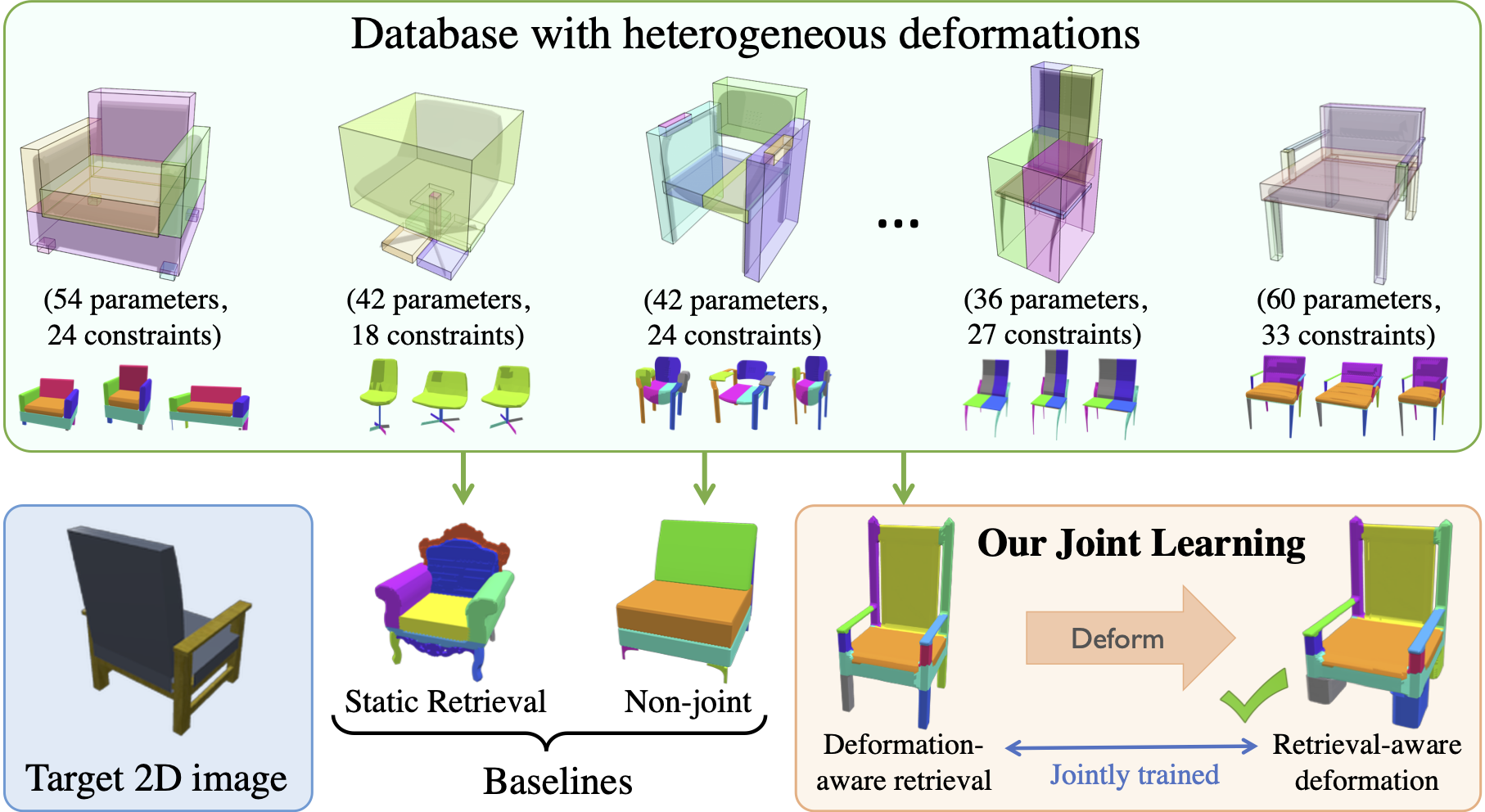Joint Learning of 3D Shape Retrieval and Deformation
Mikaela Angelina Uy, Vladimir G. Kim, Minhyuk Sung, Noam Aigerman, Siddhartha Chaudhuri and Leonidas Guibas
CVPR 2021
We propose a novel technique for producing high-quality 3D models that match a given target object image or scan. Our method is based on retrieving an existing shape from a database of 3D models and then deforming its parts to match the target shape. Unlike previous approaches that independently focus on either shape retrieval or deformation, we propose a joint learning procedure that simultaneously trains the neural deformation module along with the embedding space used by the retrieval module. This enables our network to learn a deformation-aware embedding space, so that retrieved models are more amenable to match the target after an appropriate deformation. In fact, we use the embedding space to guide the shape pairs used to train the deformation module, so that it invests its capacity in learning deformations between meaningful shape pairs. Furthermore, our novel part-aware deformation module can work with inconsistent and diverse part structures on the source shapes. We demonstrate the benefits of our joint training not only on our novel framework, but also on other state-of-the-art neural deformation modules proposed in recent years. Lastly, we also show that our jointly-trained method outperforms various non-joint baselines. Our project page can be found here, and the arXiv version of our paper can be found here.
@inproceedings{uy-joint-cvpr21,
title = {Joint Learning of 3D Shape Retrieval and Deformation},
author = {Mikaela Angelina Uy and Vladimir G. Kim and Minhyuk Sung and Noam Aigerman and Siddhartha Chaudhuri and Leonidas Guibas},
booktitle = {IEEE Conference on Computer Vision and Pattern Recognition (CVPR)},
year = {2021}
}
Dataset downloads can be found in the links below. These should be extracted in the project home folder.
-
Raw source shapes are here.
-
Processed h5 and pickle files are here.
-
Targets:
- [Optional] (already processed in h5) point cloud
- Images: chair, table, cabinet. You also need to modify the correct path for
IMAGE_BASE_DIRin the image training and evaluation scripts.
-
Automatic segmentation (ComplementMe)
For more details on the pre-processing scripts, please take a look at run_preprocessing.py and generate_combined_h5.py. run_preprocessing.py includes the details on how the connectivity constraints and projection matrices are defined. We use the keypoint_based constraint to define our source model constraints in the paper.
The renderer used throughout the project can be found here. Please modify the paths, including the input and output directories, accordingly at global_variables.py if you want to process your own data.
The pretrained models for Ours and Ours w/ IDO, which uses our joint training approach can be found here. We also included the pretrained models of our structure-aware deformation-only network, which are trained on random source-target pairs used to initialize our joint training.
Example commands to run the evaluation script are as follows. The flags can be changed as desired. --mesh_visu renders the output results into images, remove the flag to disable the rendering. Note that --category is the object category and the values should be set to "chair", "table", "storagefurniture" for classes chair, table and cabinet, respectively.
For point clouds:
python evaluate.py --logdir=ours_ido_pc_chair/ --dump_dir=dump_ours_ido_pc_chair/ --joint_model=1 --use_connectivity=1 --use_src_encoder_retrieval=1 --category=chair --use_keypoint=1 --mesh_visu=1
python evaluate_recall.py --logdir=ours_ido_pc_chair/ --dump_dir=dump_ours_ido_pc_chair/ --category=chair
For images:
python evaluate_images.py --logdir=ours_ido_img_chair/ --dump_dir=dump_ours_ido_img_chair/ --joint_model=1 --use_connectivity=1 --category=chair --use_src_encoder_retrieval=1 --use_keypoint=1 --mesh_visu=1
python evaluate_images_recall.py --logdir=ours_ido_img_chair/ --dump_dir=dump_ours_ido_img_chair/ --category=chair
- To train deformation-only networks on random source-target pairs, example commands are as follows:
# For point clouds
python train_deformation_final.py --logdir=log/ --dump_dir=dump/ --to_train=1 --use_connectivity=1 --category=chair --use_keypoint=1 --use_symmetry=1
# For images
python train_deformation_images.py --logdir=log/ --dump_dir=dump/ --to_train=1 --use_connectivity=1 --category=storagefurniture --use_keypoint=1 --use_symmetry=1
- To train our joint models without IDO (Ours), example commands are as follows:
# For point clouds
python train_region_final.py --logdir=log/ --dump_dir=dump/ --to_train=1 --init_deformation=1 --loss_function=regression --distance_function=mahalanobis --use_connectivity=1 --use_src_encoder_retrieval=1 --category=chair --model_init=df_chair_pc/ --selection=retrieval_candidates --use_keypoint=1 --use_symmetry=1
# For images
python train_region_images.py --logdir=log/ --dump_dir=dump/ --to_train=1 --use_connectivity=1 --selection=retrieval_candidates --use_src_encoder_retrieval=1 --category=chair --use_keypoint=1 --use_symmetry=1 --init_deformation=1 --model_init=df_chair_img/
- To train our joint models with IDO (Ours w/ IDO), example commands are as follows:
# For point clouds
python joint_with_icp.py --logdir=log/ --dump_dir=dump/ --to_train=1 --loss_function=regression --distance_function=mahalanobis --use_connectivity=1 --use_src_encoder_retrieval=1 --category=chair --model_init=df_chair_pc/ --selection=retrieval_candidates --use_keypoint=1 --use_symmetry=1 --init_deformation=1 --use_icp_pp=1 --fitting_loss=l2
# For images
python joint_icp_images.py --logdir=log/ --dump_dir=dump/ --to_train=1 --init_joint=1 --loss_function=regression --distance_function=mahalanobis --use_connectivity=1 --use_src_encoder_retrieval=1 --category=chair --model_init=df_chair_img/ --selection=retrieval_candidates --use_keypoint=1 --use_symmetry=1 --init_deformation=1 --use_icp_pp=1 --fitting_loss=l2
Note that our joint training approach is used by setting the flag --selection=retrieval_candidates=1.
This work and codebase is related to the following previous work:
- Deformation-Aware Embedding 3D Model Embedding and Retrieval by Uy et al. (ECCV 2020).
This repository is released under MIT License (see LICENSE file for details).
